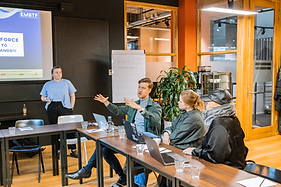

Meet the EMBTF VOL. II
table of
contents
06
join/follow/subscribe/contact

FAIRNESS
AS AN OVERARCHING
VALUE FOR THE EMBTF
Fairness in the European music sector is fundamental to the sustenance and vitality of this cultural realm. At its essence, fairness revolves around the acknowledgment and appreciation of the value inherent in musical expression. It necessitates a deep understanding and recognition of the labor, creativity, and skill invested by musicians, composers, producers, and other professionals in the music industry.
Thus, fairness in the European music sector transcends mere recognition of value; it entails active efforts to diversify and democratize the industry, making it more inclusive and accessible for all stakeholders. By embracing diversity, we not only celebrate the richness of musical expression but also address historical inequalities and power imbalances within the sector.
Diversifying the European music industry is essential for fostering fairness and inclusivity.
It involves dismantling barriers to entry and creating pathways for underrepresented voices to thrive. By supporting marginalized and neglected musicians, as well as acknowledging the importance of environmental sustainability (including nature), we reshape power dynamics, redistributing influence and resources more equitably.
Moreover, fostering transparent connections within the music sector promotes fairness by promoting accountability and trust. Transparent communication and collaboration enable fairer negotiations and transactions, ensuring that all parties involved are informed and empowered.
Central to fairness is the imperative to compensate music professionals appropriately and consistently, aligning with their status as skilled practitioners. This entails not only recognizing the tangible outputs of their work, such as recordings, performances, and compositions but also valuing the intangible aspects, such as artistic vision, innovation, and emotional resonance.
Moreover, fairness in the European music sector extends beyond mere remuneration; it encompasses broader considerations of sustainability and the retention of specialized skills and knowledge. Recognizing and fairly compensating music professionals not only fosters their continued engagement but also ensures the preservation and transmission of expertise across generations. This brings us to bridging the knowledge gap, which is another crucial aspect of advancing fairness in the European music sector. Providing musicians and industry professionals with the necessary skills and tools for greater independence enhances their agency and autonomy. By democratizing access to information and resources, we empower individuals to navigate the complexities of the industry and advocate for their rights and interests effectively.


Demystifying the commercial world and the sync industry is paramount in promoting fairness and leveling the playing field for emerging artists and independent professionals. Introducing new players to these realms and providing insights into their workings cultivates a more inclusive and equitable environment. By breaking down barriers to entry and fostering a more inclusive ecosystem, we empower a diverse range of voices to participate and thrive in the music sector.
In summary, embracing diversity, promoting transparency, bridging knowledge gaps, and demystifying industry practices are all integral to advancing fairness in the European music sector. By actively working towards these goals, we create a more equitable and inclusive environment where all stakeholders can contribute, collaborate, and flourish.
As much as we are focused on the music realm this can be translated to both the cultural and creative sector and to all types of working relationships.

other core
values

How do we implement the values into our projects?
By developing innovate music exchange strategies between EU countries
By facilitating sync camps for producers and artists with brands and other partners
By making the music business language more comprehensible
By creating databases of projects supporting gender equality in music
By developing solutions to make classical venues more inclusive and sustainable
By developing global platforms for independent collectives
By developing educational programmes for independent music professionals and middle-class musicians
By providing training and resources to aspiring female and non-binary track producers
By developing tailor made coaching programmes to empower music artists
Some of our PROJECTS
*Future Updates
What they further entail
transparency
Striving for transparent communication and collaboration to enable fairer negotiations and transactions
empowerment
Ensuring that all parties involved are informed and empowered
educatiON
Providing musicians and industry professionals with the necessary skills and tools for greater independence, their agency and autonomy
insight
Deep understanding and recognition of the labor, creativity, and skill invested by musicians, composers, producers, djs, promoters, and other professionals in the music industry
KNOWLEDGE
Democratizing access to information and resources we empower individuals to navigate the complexities of the industry and advocate for their rights and interests effectively
RECOGNITION
Not only recognizing the tangible outputs of work, such as recordings, performances etc but also valuing the intangible aspects, such as artistic vision, innovation, and emotional resonance
Inclusion
Breaking down barriers to entry and fostering a more inclusive ecosystem to empower a diverse range of voices to participate and thrive in the music sector

















